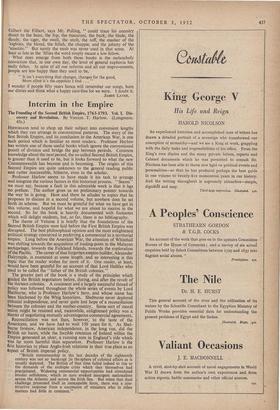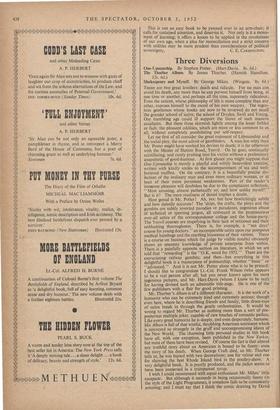Interim in the Empire
HISTORIANS tend to chop up their subject into convenient lengths which they can arrange in conventional patterns. The story of the first British Empire, and its conclusion in the American War, is one such period which is familiar to most readers. Professor Harlow has written one of those useful books which ignore the conventional point's of division and bridge the gap between periods. Common knowledge about the next period, the so-called Second British Empire, is greater than it used to be, but it looks forward to what the new Commonwealth has become and is becoming. The origins of this Second Empire are quite unknown to the general reading public and rather inaccessible, hitherto, even to the scholar.
Professor Harlow seems to have made it his task to arrange and integrate the various factors in this historical process. "Seems" we must say, because a fault in this admirable work is that it has no preface. The author gives us no preliminary pointer towards the way he is going. Here and there he alludes to topics that he proposes to discuss in a second volume, but nowhere does he set forth its scheme. But we must be grateful for what we have got in this volume, and hopeful for what we are about to receive in the second. So far the book is heavily documented with footnotes which will delight students, but, so far, there is no bibliography.
The theme of Volume I is briefly that the foundations of the Second British Empire were laid before the First British Empire was disrupted. The best philosophical opinion and the most enlightened political strategy concurred in preferring a commercial to a territorial empire. Long before the American War, the attention of Whitehall was shifting towards the acquisition of trading-posts in the Malayan archipelago, towards the Falkland Islands, towards the exploration of the Pacific. The career of that forgotten empire-builder, Alexander Dalrymple, is examined at some length, and so interesting is this topic that the reader wishes for more of it. One reader, at least, Would have been grateful for an account of that Lord Halifax who used to be called the "father of the British colonies."
The greater part of the book is a study of the principles which guided the British negotiators before, during, and after the revolt of the thirteen colonies. A consistent and a largely successful thread of policy was followed throughout the whole series of events by Lord Shelburne, who is Professor Harlow's hero, and whose name has been blackened by the Whig historians. Shelburne never deplored colonial independence, and never quite lost hope of a reconciliation between the colonies and the mother-country. Some sort of moral union might be retained and, meanwhile, enlightened policy was a matter of negotiating mutually advantageous commercial agreements.
Reconciliation was not then, however, to the taste of the Americans, and we have had to wait 150 years for it. As Shel- burne foresaw, American independence, in the long run, did the British no harm, while the forcible retention of Ireland within the Empire generated an ulcer, a running sore in England's side which was far more harmful than separation. Professor Harlow is the first historian to place Anglo-Irish relations in their true place as an aspect of British imperial policy.
"British statesmanship in the last decades of the eighteenth
century was not so bankrupt 'Lin the sphere of colonial affairs as is usually depicted. The British of that time failed indeed to rise to the demands of the multiple crisis which they themselves had precipitated. Widening commercial opportunities had stimulated insular selfishness, • which in turn evoked insurgent nationalism across the Atlantic and across the Irish Sea. But when that dual challenge presented itself in inescapable form, there was a con- structive response from a succession of ministers who in other matters had little in common."
This is not an easy book to be yawned over in an arm-chair; it calls for sustained attention, and deserves it. Not only is it a monu- ment of learning; it offers a lesson to be applied in the revolutions of our own age, when a plea for reconciliation and a strict concern with utilities may be more prudent than considerations of political



















































 Previous page
Previous page